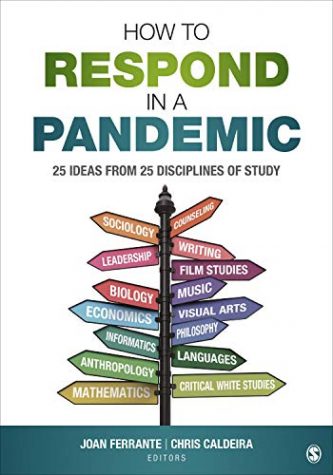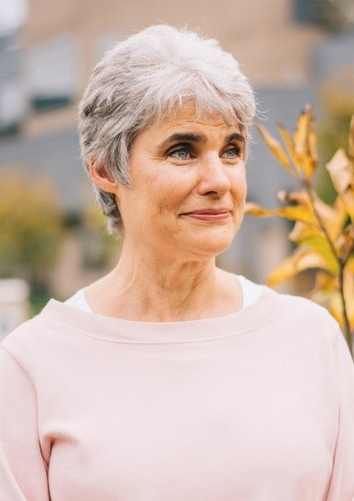NKU sociology professor Joan Ferrante creates book about the pandemic
January 12, 2021
Editor’s Note: This story was originally published in the Northern Kentucky Tribune.
Northern Kentucky University sociology professor Dr. Joan Ferrante woke up one morning when the COVID-19 pandemic first hit and thought that she and other professors needed to give students a response from their disciplines to the pandemic.
Ferrante recruited 24 professors on a first-come-first-serve basis to have them each write an essay about the pandemic from the lens of their disciplines—such as mathematics, history or film studies. The end result was How to Respond in a Pandemic: 25 Ideas from 25 Disciplines of Study. The book aims to offer a response, to students at NKU and nationwide, about the pandemic.
“I think that it is important that education address the pandemic, especially higher [education] because the students were in our classes—they were in our classes when the pandemic struck,” Ferrante said. “And for us to be silent about how to respond, or what our discipline says is a way to respond, would be negligent.”
Ferrante wanted to make a response beyond what the University was offering and gear it toward students’ majors and disciplines. She said the basic idea of the book is that the authors of the essays have something to say about the pandemic specific to their discipline and that they care about their students.
The writing process
The book itself was edited and reviewed by students—called reader advocates—in order to make sure the essays were readable and understandable to those who aren’t experts in that field. The students read the essays, explained what was and wasn’t working, offered feedback on how to make the writing more clear and concise and then sent it back to the author. This process continued until all the essays were fully edited and ready to be published. Ferrante said all of her colleagues were willing to have their work edited by students.
“I kept writing, ‘Now, if you want to jump off, this is very unusual. If you want to jump off, this is your time.’ Nobody jumped off,” Ferrante said. “I just really love my colleagues for that—that they were so generous and wanted everyone to understand what their discipline had to offer.”
Ferrante said it was important that the writing was clear and understandable but not “dumbed down.” She said she wanted to offer something to students when their lives were tough, as students invest their time and money in education and should hear from their educators.

“When I wrote, I thought, ‘I don’t want someone who’s hungry or lost their job or they have COVID or they’re sick, that we get in the way of them reading because we weren’t clear, or we didn’t give them enough information,’” Ferrante said. “I wanted it to be readable to especially those were having a rough time.”
The writing process was a learning experience for Ferrante and the other experts, she said. The authors were able to see what people didn’t understand about their writing—if they wrote too much or had gone off-topic. Ferrante said this editing process made the essays better, as the experts listened to what the readers needed and fixed it accordingly.
“To collaborate with 24 other people, I think that brought a kind of joy to things. Because, oftentimes, we don’t collaborate enough or cross disciplines enough, so I would say everybody was pretty happy about the project,” Ferrante said.
25 disciplines
Each discipline offered a response to the pandemic. The history expert wrote about how people should look to the past in order to understand the present. The author takes the reader back to the time of the Black Plague and shows readers how people responded and reacted back then.
“It’s like an exact replica of how we’re responding, they responded in medieval times. There’s something about that that comforts people comforts … it’s like, ‘Haven’t we learned anything?’ You kind of get that feeling, too, about it,” Ferrante said.
The film studies expert wrote about how people should look to film to make predictability out of chaos. Previous pandemic films can offer an insight into how people are behaving now and what people can expect from the pandemic, which then can make it less frightening.
The trauma studies expert wrote about different types of responses to trauma—such as a fight, flight, flock and/or faint response. Ferrante said this gave students the ability to put labels on their responses to the pandemic and interpret their feelings better.
Ferrante said her favorite aspect of the book was realizing how similar and different some disciplines are, particularly mathematics and sociology.
The end result
Ferrante said it felt good to document a response to the pandemic for historical purposes since the last global pandemic was over 100 years ago.
“I feel just that we documented, we met our goal and we made a response,” Ferrante said. “I think there was a relief to that. It is kind of hard to do something like that in a few months because you can’t wait years to write—to get it out—you have to do it in a couple months or it doesn’t matter. I think it was just a relief.”
Some classes at NKU are using the book as assignments, with students answering prompts and questions about how the book made them feel, what did they learn and more. Ferrante said the general response she’s getting from students is that the pandemic is less chaotic now because they have a frame and language to look at the pandemic through. Ferrante said once we gain control of a situation, it’s no longer chaotic.
“If all it affects is the students that read the book at NKU this last semester, I’m happy because they were so touching in what they liked in the book and what they never thought about before and now think about,” Ferrante said.

